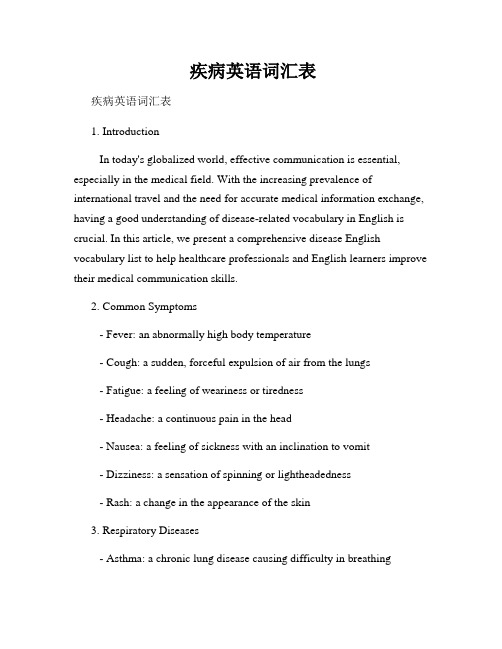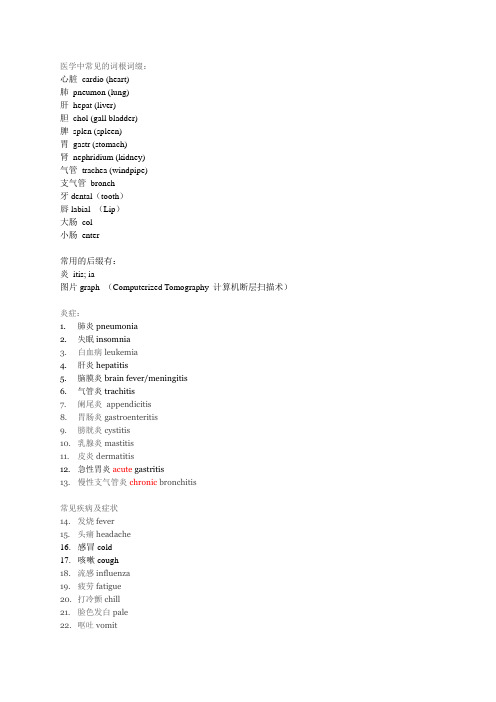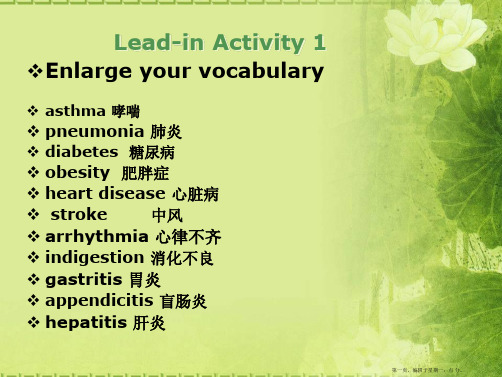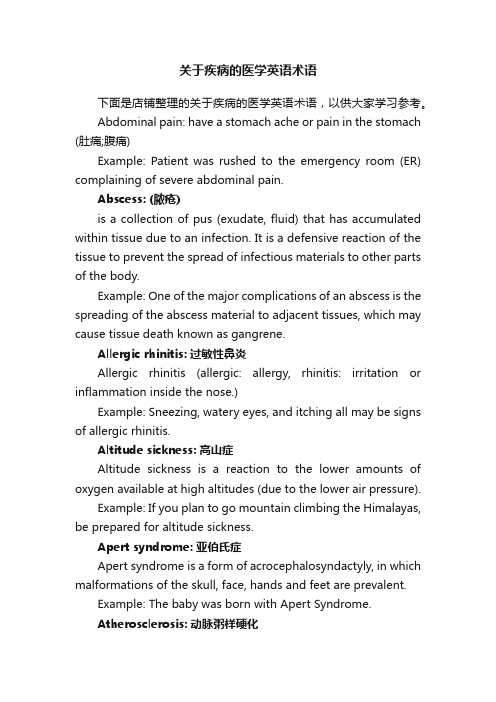常见英语生病词
疾病英语词汇表

疾病英语词汇表疾病英语词汇表1. IntroductionIn today's globalized world, effective communication is essential, especially in the medical field. With the increasing prevalence of international travel and the need for accurate medical information exchange, having a good understanding of disease-related vocabulary in English is crucial. In this article, we present a comprehensive disease English vocabulary list to help healthcare professionals and English learners improve their medical communication skills.2. Common Symptoms- Fever: an abnormally high body temperature- Cough: a sudden, forceful expulsion of air from the lungs- Fatigue: a feeling of weariness or tiredness- Headache: a continuous pain in the head- Nausea: a feeling of sickness with an inclination to vomit- Dizziness: a sensation of spinning or lightheadedness- Rash: a change in the appearance of the skin3. Respiratory Diseases- Asthma: a chronic lung disease causing difficulty in breathing- Pneumonia: an infection that inflames the air sacs in one or both lungs- Tuberculosis (TB): a bacterial infection that primarily affects the lungs- Chronic Obstructive Pulmonary Disease (COPD): a progressive lung disease that obstructs airflow4. Cardiovascular Diseases- Hypertension: high blood pressure- Coronary Artery Disease (CAD): a narrowing or blockage of coronary arteries- Myocardial Infarction (MI): commonly known as a heart attack- Arrhythmia: an irregular heartbeat rhythm- Congestive Heart Failure (CHF): a chronic condition where the heart fails to pump blood effectively5. Gastrointestinal Diseases- Gastritis: inflammation of the lining of the stomach- Gastroenteritis: inflammation of the stomach and intestines, often caused by a viral or bacterial infection- Peptic Ulcer Disease (PUD): sores that develop in the lining of the stomach or the first part of the small intestine- Hepatitis: inflammation of the liver, usually caused by a viral infection- Crohn's Disease: chronic inflammation of the digestive tract6. Neurological Disorders- Alzheimer's Disease: a progressive brain disorder that affects memory, thinking, and behavior- Parkinson's Disease: a degenerative disorder that affects movement and balance- Epilepsy: a neurological disorder characterized by recurring seizures- Multiple Sclerosis (MS): an autoimmune disease that affects the central nervous system7. Infectious Diseases- Influenza: a contagious viral infection causing respiratory illness- Malaria: a mosquito-borne infectious disease causing fever and chills- Dengue Fever: a mosquito-borne viral infection causing severe flu-like symptoms- Ebola: a severe and often fatal viral disease- HIV/AIDS: a virus that attacks the immune system, leading to acquired immune deficiency syndrome8. ConclusionThis disease English vocabulary list provides a foundation for understanding and discussing various medical conditions in English. By familiarizing oneself with these terms, healthcare professionals can improve patient communication, facilitate accurate diagnosis, and enhance their overall communication skills in an international setting. English learners can also use this vocabulary list to expand their medical knowledge and improve their language proficiency. Remember, effective communication is key to providing quality healthcare, regardless of language barriers.。
英语重点词汇be sick of详解

英语重点词汇be sick of详解be sick表示病了,做谓语.本身是形容词,有多种意思. 最通常的是:生病,恶心,呕吐,不适,晕,厌烦,无法忍受a sick child生病的孩子Her mother's very sick.她母亲病得很厉害。
Mum, I feel sick !妈,我想吐!I was sick three times in the night.夜里我吐了三次。
She had been violently sick .她一直吐得很厉害。
fall sick患病;生病a sick joke令人毛骨悚然的笑话a sick mind变态的心理People think I'm sick for having a rat as a pet.人们认为我养只耗子当宠物是变态。
We live in a sick society.我们生活在一个病态的社会里。
If you eat any more cake you'll make yourself sick . 你要是再吃蛋糕,就该吐了。
seasick晕船airsick晕机carsick晕车travel-sick旅行晕眩的Where have you been? I've been worried sick about you.你上哪儿去了?把我急死了。
让人恶心: "What he said was sick."让人厌烦,无法忍受: "I'm sick of her rudeness."(我真是无法忍受她的粗鲁。
)be sick of+sb/sth(doing sth)(对…)厌恶,受够了,厌烦,腻烦,厌恶,讨厌,发腻,厌倦bored with or annoyed about sth that has been happening for a long time, and wanting it to stopI'm sick of your having hysterics, okay?我受够了你的歇斯底里,知道吗?《柯林斯高阶英汉双解学习词典》The public is sick of spin and tired of promises. It's time for politicians to act.公众厌烦了那些有倾向性的报道和种种许诺。
英文中常见疾病test

医学中常见的词根词缀:心脏cardio (heart)肺pneumon (lung)肝hepat (liver)胆chol (gall bladder)脾splen (spleen)胃gastr (stomach)肾nephridium (kidney)气管trachea (windpipe)支气管bronch牙dental(tooth)唇labial (Lip)大肠col小肠enter常用的后缀有:炎itis; ia图片graph (Computerized Tomography 计算机断层扫描术)炎症:1.肺炎pneumonia2.失眠insomnia3.白血病leukemia4.肝炎hepatitis5.脑膜炎brain fever/meningitis6.气管炎trachitis7.阑尾炎appendicitis8.胃肠炎gastroenteritis9.膀胱炎cystitis10.乳腺炎mastitis11.皮炎dermatitis12.急性胃炎acute gastritis13.慢性支气管炎chronic bronchitis常见疾病及症状14.发烧fever15.头痛headache16.感冒cold17.咳嗽cough18.流感influenza19.疲劳fatigue20.打冷颤chill21.脸色发白pale22.呕吐vomit23.昏迷stupor (faint,dizzy)24.中暑heat stroke25.盗汗night sweat26.不适discomfort/disorder27.急症casualty消化系统(digestive system)28.消化不良indigestion29.营养不良malnutrition30.腹痛stomach ache/pain31.痢疾diarrhoea32.水土不服endemic33.食物中毒food poisoning常用慢性病(chronic disease)34.中风stroke (hypertension, high blood pressure)35.冠心病coronary heart disease36.糖尿病diabetes37.肺结核pulmonary tuberculosis38.心脏病heart disease, heart attack (chest and back ache)39.哮喘asthma40.瘫痪paralysis常见致命病症(vital disease)41.肿瘤tumor42.癌症cancer: 肺癌lung cancer; 肝癌liver cancer43.禽流感bird flu/avian influenza44.甲型H1N1流感Swine flu45.非典SARS(Severe Acute Respiratory Syndrome)46.疯牛病mad cow disease47.黑死病black death48.爱滋病AIDS(Acquired Immune Deficiency Syndrome)49.狂犬病rabies皮肤和眼睛(derma and optical)50.freckle/ephelis 痣,雀斑51.acne 粉刺52.itching 发痒53.cataract 白内障54.my opia近视(nearsightedness)55.presby opia远视(eye sight)56.colour blindness 色盲外伤:57.fracture骨折58.dislocation 脱臼59.sprain 扭伤60.scalding烫伤61.scratch 搔挠62.trauma 外伤63.bruise 淤伤64.cripple 瘸子其他常用词65.auscultation 听诊66.prescription 开药方67.relapse 复发症68.syndrome 综合症69.registration 挂号70.operation 手术71.diagnose 诊断72.quarantine 检疫73.vaccinate 打疫苗74.injection 打针75.internal medicine 内科76.surgery 外科77.allergic 过敏的78.numb 麻木79.incubation 潜伏期。
英语有关疾病词汇学习

第六页,编辑于星期一:点 分。
❖ Aerobic exercise 有氧运动 ❖ Bodybuilding 健身
❖ Feeble 虚弱的
❖ Flabby 不结实的,松弛的
❖ Food additive 食品添加剂 ❖ Food colorant 食品色素 ❖ Health care 保健
❖ Health facilities 卫生设施
第四页,编辑于星期一:点 分。
❖poisoning 中毒 ❖fatigue 疲劳 ❖heat stroke 中暑 ❖itching 发痒 ❖ache/pain 痛 ❖tetanus 破伤风 ❖night sweat 盗汗
第五页,编辑于星期一:点 分。
❖chill 打冷颤 ❖pale 脸色发白 ❖shuddering 发抖 ❖inflammation 炎症 ❖acute 急症 ❖chronic 慢性病 ❖congenital 先天性病 ❖nausea 恶心 ❖vomit 呕吐
❖ gastritis 胃炎
❖ appendicitis 盲肠炎
❖ hepatitis 肝炎
第一页,编辑于星期一:点 分。
❖dermatitis 皮炎 ❖flu 流感 ❖diarrhea 痢疾 ❖vaccinate 打疫苗 ❖endemic 水土不服 ❖sprain 扭伤 ❖scalding 烫伤 ❖graze 擦伤 ❖scratch 搔挠 ❖trauma 外伤 ❖bruise 淤伤
❖ Junk food 垃圾食品 ❖ Low-fat food 低脂食品
❖ Mineral 矿物质
第七页,编辑于星期一:点 分。
❖ Obese 肥胖的 ❖ Pesticide 农药 ❖ Plump 丰满的
❖ Robust 健康有活力的
有关疾病的英文词汇:disease_医学英语词汇

disease 疾病anemia, anaemia 贫血angina pectoris 心绞痛appendicitis 阑尾炎arthritis 关节炎bronchitis 支气管炎cancer 癌catarrh 卡他,粘膜炎chicken pox, varicella 水痘cholera 霍乱cold 感冒,伤风,着凉(head) cold 患感冒diabetes 糖尿病diphtheria 白喉eczema 湿疹epilepsy 癫痫erysipelas 丹毒gangrene 坏疽german measles, rubella 风疹gout 痛风headache 头痛hemiplegy, hemiplegia 偏瘫,半身不遂interus, jaundice 黄疸indigestion 消化不良influenza, flu 流感insanity 精神病leukemia 白血病malaria 疟疾malnutrition 营养不良malta fever 马耳他热,波状热measles 麻疹migraine, splitting headache 偏头痛miocardial infarction 心肌梗塞mumps 流行性腮腺炎neuralgia 神经痛neurasthenia 神经衰弱paralysis 麻痹peritonitis 腹膜炎pharyngitis 咽炎phtisis 痨病,肺结核pneumonia 肺炎poliomyelitis 脊髓灰质炎rabies 狂犬病rheumatism 风湿病rickets, rachitis 佝偻病scabies, itch 疥疮scarlet fever 猩红热sciatica 坐骨神经痛sclerosis 硬化septicemia, septicaemia 败血病sinusitis 窦炎smallpox 天花swamp fever 沼地热syncope 晕厥syphilis 梅毒tetanus 破伤风thrombosis 血栓形成torticollis, stiff neck 斜颈tuberculosis 结核病tumour 瘤 (美作:tumor) typhus 斑疹伤寒urticaria, hives 荨麻疹whooping cough 百日咳yellow fever 黄热病zona, shingles 带状疮疹。
关于疾病的医学英语术语

关于疾病的医学英语术语下面是店铺整理的关于疾病的医学英语术语,以供大家学习参考。
Abdominal pain: have a stomach ache or pain in the stomach (肚痛;腹痛)Example: Patient was rushed to the emergency room (ER) complaining of severe abdominal pain.Abscess: (脓疮)is a collection of pus (exudate, fluid) that has accumulated within tissue due to an infection. It is a defensive reaction of the tissue to prevent the spread of infectious materials to other parts of the body.Example: One of the major complications of an abscess is the spreading of the abscess material to adjacent tissues, which may cause tissue death known as gangrene.Allergic rhinitis: 过敏性鼻炎Allergic rhinitis (allergic: allergy, rhinitis: irritation or inflammation inside the nose.)Example: Sneezing, watery eyes, and itching all may be signs of allergic rhinitis.Altitude sickness: 高山症Altitude sickness is a reaction to the lower amounts of oxygen available at high altitudes (due to the lower air pressure).Example: If you plan to go mountain climbing the Himalayas, be prepared for altitude sickness.Apert syndrome: 亚伯氏症Apert syndrome is a form of acrocephalosyndactyly, in which malformations of the skull, face, hands and feet are prevalent.Example: The baby was born with Apert Syndrome.Atherosclerosis: 动脉粥样硬化is a condition in which arteries harden or thicken due to accumulation of fatty materials. Athero SclerosisBenign prostatic hyperplasia (BPH): 良性前列腺增生症Also called benign enlargement of the prostate (BEP), is an increase in size of the prostate.Example: A rectal examination may reveal benign prostatic hyperplasia.Blister (水泡):is a small pocket of fluid within the upper layers of the skin, typically caused by friction, burning, freezing, chemical exposure or infection. Most blisters are filled with a clear fluid called serum or plasma.Example: My new shoes gave me blisters on my feet!。
患病类英语单词
患病类英语单词Disease-related English Vocabulary (1800 words)Medical Terminology:1. Symptoms: Symptoms are the physical or mental changes that indicate the presence of a disease or condition. Examples include fever, cough, headache, and fatigue.2. Diagnosis: Diagnosis refers to the identification of a disease or condition based on symptoms, medical history, physical examination, and laboratory tests. It helps doctors determine the appropriate treatment.3. Treatment: Treatment is the medical care provided to patients to manage or cure their diseases. It can involve medications, surgeries, therapies, or lifestyle changes, depending on the condition.4. Complications: Complications are additional medical problems that arise as a result of a disease or its treatment. Examples include infections, organ damage, or side effects from medication.Common Diseases:1. Cold: The common cold is a viral infection that primarily affects the nose and throat. It causes symptoms such as sneezing, runny nose, sore throat, and cough. Rest and over-the-counter medications can help manage the symptoms.2. Flu: Influenza, commonly known as the flu, is a contagious respiratory illness caused by influenza viruses. It presents with symptoms similar to acold but is usually more severe. Vaccination is recommended to prevent the flu.3. Asthma: Asthma is a chronic lung condition characterized by inflammation and narrowing of the airways. It can cause wheezing, shortness of breath, coughing, and chest tightness. Inhalers and avoidance of triggers are typically part of asthma management.4. Diabetes: Diabetes is a chronic condition that affects how the body processes blood sugar (glucose). There are two main types: type 1 and type 2 diabetes. Symptoms include frequent urination, excessive thirst, fatigue, and weight loss. Treatment includes medication, diet modifications, and regular exercise.5. Hypertension: Hypertension, or high blood pressure, occurs when the force of blood against the artery walls is consistently too high. It is often asymptomatic but can lead to serious health complications if left untreated. Lifestyle changes and medications are common treatments for hypertension.6. Cancer: Cancer is a group of diseases characterized by abnormal cell growth. It can affect any part of the body and cause various symptoms depending on the type and stage. Treatment options include surgery, chemotherapy, radiation therapy, and immunotherapy.7. Depression: Depression is a mental health disorder characterized by persistent feelings of sadness, loss of interest, and a lack of motivation. It can impact daily functioning and quality of life. Psychotherapy and medications are commonly used to treat depression.8. Alzheimer's Disease: Alzheimer's disease is a progressive brain disorder that affects memory, thinking, and behavior. It is the most common form of dementia in older adults. While there is no cure, medications and lifestyle modifications can help manage symptoms.9. Arthritis: Arthritis refers to inflammation of the joints and can cause pain, stiffness, and swelling. There are different types of arthritis, including osteoarthritis and rheumatoid arthritis. Treatment options may include medication, physical therapy, and joint protection techniques.10. Stroke: A stroke occurs when the blood flow to the brain is disrupted, either due to a blood clot or a hemorrhage. It can cause sudden weakness, numbness, difficulty speaking, and loss of coordination. Immediate medical attention is crucial to minimize brain damage.Remember, this is just a brief overview of disease-related vocabulary. There are hundreds of medical conditions with their own unique symptoms, diagnosis, and treatment options. Consult a medical professional for accurate and personalized information.。
有关生病、疾病症状的英语表达集锦(英汉对照)
有关生病、疾病症状的英语表达集锦(英汉对照)关于生病、疾病症状的英语表达(英汉对照)头痛headache 感冒cold咳嗽cough肺炎pneumonia肝炎hepatitis脑膜炎brain fever/meningitis膀胱炎cystitis急性胃炎acute gastritis胃炎gastritis气管炎trachitis支气管炎bronchitis阑尾炎appendicitis胃肠炎gastroenteritis乳腺炎mastitis肿瘤tumor癌症cancer禽流感bird flu/avian influenza非典SARS(Severe Acute RespiratarySyndrome)疯牛病mad cow disease黑死病black death白血病leukemia爱滋病AIDS(Acquired ImmuneDeficiency Syndrome)流感influenza白内障cataract狂犬病rabies中风stroke冠心病coronary heart disease糖尿病diabetes肺癌lung cancer肝癌liver cancer肺结核pulmonary tuberculosis肝硬化hepatocirrhosis慢性病chronic肺气肿emphysema胃癌cancer of stomach胃病stomach trouble心脏病heart disease发烧fever生病常用英文(1)一般病情:He feels headache, nausea and vomiting. (他觉得头痛、恶心和想吐。
) He is under the weather. (他不舒服,生病了。
) He began to feel unusually tired. (他感到反常的疲倦。
)He feels light-headed. (他觉得头晕。
)She has been shut-in for a few days. (她生病在家几天了。
常见生的病及医生建议英语单词大全100个
1 常见生的病及医生建议英语单词大全100个 一、 内科常用字汇 心血管系统 血液及淋巴系统 唿吸系统 消化系统 内分泌系统 神经系统 肌肉骨骼系统 泌尿及男性生殖系统 特殊感觉器官 综合字汇 二、 妇产科常用字汇 三、 小儿科常用字汇 四、 精神科常用字汇 五、 各科常用缩写 六、 解剖式内外科常用字汇 七、癌症相关单字 八、医院内常见单字 九、病历表内常见单字 2
十、诊断用具 一、 内科常用字汇 心血管系统 The Cardiovascular System Acute Myocardial Infarction (AMI) 急性心机梗塞 Electrocardiogram (DCG) 心电图 Hypertensive Cardiovascular Disease 高血压性心脏血管疾病 Congential Heart Disease 先天性心脏病 Hemangioma 血管瘤 Vasodilatation 血管扩张 Arteriosclerosis 动脉硬化 Hypertension 高血压 Hypertrophy 肥大 Hypotension 低血压 Varicose veins 静脉曲张 血液及淋巴系统 The Hemic and Lymphatic System Adenitis 腺炎 Acute Lymphogenous Leukemia 急性淋巴球性白血病 Leukocyte 白血球 Leukocytopenia白血球减少 Systemic Lupus Erythematosus 全身性红斑性狼疮 3
Splenomegaly 脾肿大 Anemia贫血 Aseptic 无菌的 Septicemia败血症 Hemostasis 止血 Transfusion输血 唿吸系统 The Respiratory System Pulmonary embolism 肺栓塞 Mucosa 黏膜 Exhale唿吸 Apnea窒息 Tachypnea唿吸急促 Pneumonia肺炎 Bronchitis支气管炎 Lung Empyema 肺积脓 消化系统 The Digestive System Short of breath 唿吸短促 Dysphasia说话困难 Aphasia 失语症 Aphonia失声 4
英语语法同义词辨析详解ill,sick
英语语法同义词辨析详解ill, sick要、ill 形容词、副词。
作形容词表示“生病、身体不适(仅作表语);坏的、不良的、恶劣的(仅作定语)”。
作副词时表示“不好、坏”。
作表语时常可和sick换用,但在美国英语中用sick,在英国英语中用ill。
作副词时或修饰动词时表示“坏”的意思,此时的反义词我为well。
ill还可以作名词表示“毛病、弊端、坏事”等。
例如:He is ill. 他病了。
He looked worried and ill. 他看上去是焦虑、生病的样子。
He has an ill temper. 他脾气不好。
It ill befits a man to betray old friends. 出卖老朋友不是一个好人。
二、sick 形容词。
意思是“生病、病了、恶心、呕吐、难受、”。
作表语和定语。
例如:He is sick,,I believe. 他病了,我相信。
He has a sick look. 他有病相。
The boy ate the large tarts and then began to feel sick.这男孩吃了大馅饼,然后就开始想吐。
The sick and the wounded were sent home. 病人和伤员都送回家了。
(新来的朋友:您不妨先点个关注以便阅读往期文章并欢迎点赞转发)一、in future“今后、以后”。
指从今天开始的将来时间。
例如:In future you are not to go out alone. 你以后不要单独外出。
I shall look after her in future. 我今后会照顾好她的。
In future I must do better than that. 今后我一定会做得更好。
二、in the future“将来、以后”。
指将来的某段时间。
例如:In the future travel agencies may be organizing trips to the moon. 将来旅行社也许会组织到月球的旅游。
- 1、下载文档前请自行甄别文档内容的完整性,平台不提供额外的编辑、内容补充、找答案等附加服务。
- 2、"仅部分预览"的文档,不可在线预览部分如存在完整性等问题,可反馈申请退款(可完整预览的文档不适用该条件!)。
- 3、如文档侵犯您的权益,请联系客服反馈,我们会尽快为您处理(人工客服工作时间:9:00-18:30)。
1. Do you smoke cigarattes 你抽烟吗?(有抽烟保费较贵喔)2. skin disease,including acne acne 这个字是粉刺的意思,另外一个常用字pimple,是青春痘3. frequent or severe headaches 经常性或严重的头痛4. Severe head injury 严重的头部伤害5. Corrective lenses (glasses or contacts)lense是镜头的意思,在这里指的是眼镜,glasses是一般我们戴在鼻樑上的眼镜,contacts是隐形眼镜(注意是复数)6. Eye disease 眼疾7. Ear,nose,or throat trouble 耳鼻喉方面的问题8. Hearing difficulty 听力困难9. Ruptured or perforated ear drum 耳膜破裂或穿孔10. Hay fever or other non-drug allergy 这个在美国倒是很常见,Hay fever指的是花粉热11. Severe tooth or gum trouble 严重的牙齿或口腔毛病,这里gum指的不是我们嚼的口香糖(chewing gum),gum这里指的是口腔12. Thyroid disorder Thyroid,甲状腺13. Close contact with tuberculosis 这个字tuberculosis倒是很常出现在Reader's Digest里,肺结核的意思14. Abnormal chest x-ray 是不是有过异常的x-ray finding15. Asthma 气喘,记得这个字好像曾经出现在托福的听力里,托福听力也常常出现allergy,allergic 这些字,因为美国人有hay fever的不在少数16. Shortness of breath 呼吸困难,竟然是用shortness这个字,我就想不到17. Chest pain or pressure 胸痛或胸口郁闷18. Chronic cough chronic是慢性疾病的意思,不过这里我想翻译成「久咳不癒」比较适当19. Heart pounding 心绞痛,pound是重击。
20. Heart murmur 心杂音,murmur是喃喃细语的意思。
21. High blood pressure 高血压22. Severe or recurrent abdominal pain recurrent是一再複发的意思,这个是问你是不是曾有严重的或是一再複发的下腹部疼痛23. Stomach or duodenal ulcer duo这个字首是「十二」的意思,duodenal是十二指肠的意思,念法是duo-'deen-nal. ulcer是溃疡24. Chronic or recurent diarrhea diarrhea这个字也可以写成diarrhoea,拉肚子的意思25. Gall bladder disease 胆囊方面的毛病。
(Gall bladder 胆囊,bladder 则指膀胱)26. Sexually transmitted disease 性传染病。
嘿……你没有得到吧。
27. Hernia (rupture)疝气,据说女生也会得,而且发生的地方也不只胯下~28. Hemorrhoids (piles)痔疮,前面的是医学名词,后面的是我们平常用的。
像是上小号,正式的名称是urinate,不过这是医生说的,我们通常都说piss,或是直接用pee29. Urinary problem 知道urinate,这个字可以猜猜看吧?30. Blood,sugar,albumin in urine 尿中是否有糖,血或是血蛋白……因为正常人尿中这些量都是极少的。
albumin是一种血蛋白31. Bone or joint disability or deformity 骨骼或关节失能或变型32. Loss of an extremity or portion thereof extremity是四肢的意思,当然你要是说arms and legs人家也听得懂啦。
这句话是问,你是不是有截肢过?33. "Trick" joint 经常性的关节脱落34. Varicose veins 静脉曲张35. Foot trouble 脚的毛病36. Frequent or severe back trouble 经常性或严重的背痛37. Paralysis (including polio)瘫痪或是小儿麻痺38. Dizzy or fainting spells 短时间意识丧失(昏倒),不需要抢救也能自己醒过来39. Convulsions or epilepsy 抽搐或癫痫症(俗称羊癫疯)40. Psychiatric disorder 精神方面的疾病41. Diabetes 糖尿病42. Rheumatic fever or heart disease 风湿或心脏病43. Hepatitis 肝炎44. Infectious mononucleosis 传染性单核细胞增多症,是一种EBV(EB病毒)所引起的急性传染病,病情轻者可以自然好转.45. Scarlet fever 猩红热46. Mumps 腮腺炎47. Whooping cough 百日咳48. Chicken pox 水痘49. Rubella (German measles or "3 day")德国麻疹50. Rubeola (red measles or "2 week")这两个都是德国麻疹,不晓得有什么不同?51. Drug sensitivity or drug allergy. 对药物过敏52. Menstrual abnormality-cramps,missed periods 月经不规则53. Malaria 疟疾54. Dysentery 痢疾55. Anemia 贫血Please list all medications,including vitamins,and birth control pills. Name any illness,injury,disability,or surgery not mentioned above. Include tonsillectomy,appendectomy and medical and/or psychiatric treatment you are receiving. p.s:tonsillectomy扁桃腺切除appendectomy盲肠切除-ectomy是切除身体某个器官的意思医院看病就诊的常用英语(2)She has noticed one lump in her breast. (她发觉乳房有个肿块。
)There is a hard, swollen lump on her right breast. (她右乳房有肿块。
)Her left breast is painful and swollen. (她左乳房疼痛且肿大。
)本文章来自于 博客She has heavy bleeding with her periods. (她月经来的很多。
)Her vaginal discharge is white or greenish-yellow and unpleasant smelling. (她阴道分泌物带白色或绿黄色,而且气味不好。
)She has noticed occasional spotting of blood between periods. (在月经来的前后,她有时也发觉有滴滴达达的流血。
)She has some bleeding after intercourse. (性交后有出血。
)She feels some vaginal itching. (她感到阴部发痒。
)She has painful periods and abnormal vaginal discharge. (她月经来时疼痛,而且阴道有不正常的分泌物。
)男性疾病:He urinates more frequently than usual.(他小便比平时多。
)He has difficulty controlling his bladder.(他很难控制小便。
)(bladder 是膀胱)There are some lumps on his testicles. (他的?丸有些硬块。
)He has had burning or pain when he urinates.(他小便时感到发烫和疼痛。
)He is passing less urine than usual.(他小便比平时少。
)He has had painless swelling in his scrotum.(他的阴囊有不痛的肿大。
)He feels lack of interest in ***.(他自觉对性的兴趣大减。
)He has difficulty starting his urine flow.(他小便不畅通。
)His urine stream is very weak and slow.(他小便流动得很慢很弱。
)He dribbles a little urine after he has finished urinating.(他小便后,还会有少量零星地滴下。
)He has had some discharge from his penis.(他的阴茎排出一些流脓。
)His urine is cloudy and it smells strong.(他的小便混浊,而且气味不好。
)He has a dull heavy ache in the crotch.(他的胯部感到隐痛。
)He has a small leakage of urine when h e coughs or sneezes.(他咳嗽或打喷嚏时,会有点泄尿。
)He has trouble urinating.(他小便有困难。
)呼吸方面:His breathing has become increasingly difficult.(他呼吸越来越困难。
)He has to breathe through his mouth.(他要用口呼吸。
)He is short of breath, even when he has not been exercisi ng, he is breathless.(他喘气;即使不运动,他也是上气不接下气。
